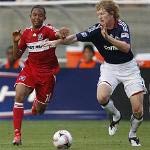
FAITH LAPIDUS: I'm Faith Lapidus.
DOUG JOHNSON: And I'm Doug Johnson with EXPLORATIONS in VOA Special English. Today we tell about the highest level of men's soccer in the United States — Major League Soccer. We hear from three players who have links to Washington, D.C.
(SOUND)
Ben Olsen and Curt Onalfo had great careers as professional players. Now, they are passing on their knowledge as coaches with D.C. United. Mike Banner plays for the Chicago Fire, but started in Washington. Their stories tell a lot about the past, present and future of professional soccer in America.
FAITH LAPIDUS: In 1993, soccer in the United States started on a new road. It had been almost ten years since the last major soccer league in the United States had closed down. The North American Soccer League lasted from 1968 to 1984.
The NASL had some notable successes. One team signed two of the most famous players in soccer history: Edison Arantes do Nascimento, better known as Pele, of Brazil and Franz Beckenbauer of Germany. Both stars played for the New York Cosmos in front of big crowds. At the time, their best playing days were behind them. Yet foreign players like these planted the seeds of renewed interest in soccer in America.
(SOUND)
DOUG JOHNSON: But, the rest of the league struggled to attract fans. In the United States, soccer competes with baseball, American football and basketball. All these sports are American inventions and have developed wide support in schools, amateur and professional leagues.
Major League Soccer came with a different purpose. It began as part of the effort for the United States to hold the 1994 World Cup competition. But it was also an attempt to establish a top professional level for soccer in America.
The first season took place in 1996. At the start, one team established itself as the league's best. D.C. United won the first two M.L.S. championships. Today, the team has won more league championships than any other.
FAITH LAPIDUS: Ben Olsen was an important part of D.C. United's early success. He was the top new player, or rookie of the year, in 1998. His young pro career reached a high point the next season. D.C. United won the M.L.S. Cup, the league championship, on the strength of a Most Valuable Player performance by Olsen. He scored one of two goals for his team in the win against the Los Angeles Galaxy.
DOUG JOHNSON: Ben Olsen looks back on his score in that championship as his most memorable.
BEN OLSEN: "I'd lost a lot of championships before that year, so that was a special game."
DOUG JOHNSON: Like many top American soccer players, Olsen played overseas. He joined the club Nottingham Forest in Britain. He says different leagues have different styles of play.
BEN OLSEN: "Some teams are very fast and athletic. Some teams are more possession oriented, meaning a little bit more low pressure on the ball and more skillful players. England has always been known to be a fast and physical league."
Olsen was also a part of the United States World Cup team of 2006. He says playing for his country was something he will never forget.
FAITH LAPIDUS: Ben Olsen has had five operations for severe ankle injuries. Still, he had one of his best years in 2007. He scored seven goals including a "hat trick"-- three in one game.

(SOUND)
He was recognized for his outstanding play with an M.L.S. Best Eleven award. He accepted the award in a wheelchair after a minor operation became major ankle surgery. Ben Olsen retired after the 2009 season. Today he is an assistant coach with D.C. United.
(MUSIC)
DOUG JOHNSON: The head coach of D.C. United knows about success. Curt Onalfo has won championships at every level in American soccer. He was a top player on two state championship teams in high school in Connecticut. He was a college player for the University of Virginia. His team won a national championship in 1989 which the school shared with Santa Clara University.
The year before, he first played with the United States National Team in a victory over Costa Rica. Curt Onalfo's playing career included many appearances with the National Team and a victory in the M.L.S. Cup in 1999.
But coaching seemed a natural move for him. He spent four years as an assistant coach under Bruce Arenas with the United States National Team. Arenas had coached Onalfo at the University of Virginia. In 2006, Onalfo assisted Arenas coaching the United States' World Cup team.
FAITH LAPIDUS: Curt Onalfo became head coach of the Kansas City Wizards in 2007. That year, he led the team to the conference finals. The Wizards reached the playoffs again the following year. But his new team, D.C. United, has struggled at the start of the season. The team has only two wins in league play. But, Onalfo knows how things can change — for better or worse.
On his 24th birthday, doctors told Onalfo he had non-Hodgkin's lymphoma, a cancer of the immune system. He received chemotherapy for six months. During that time, Onalfo thought about what he really wanted to do with his life: play soccer. He also says having faced cancer prepared him for leadership in good times and bad.
CURT ONALFO: "Your players are always looking up to you, and they're looking for guidance. And I feel like having dealt with adversity really helps me to lead a group of men through difficult times as well."
Looking for the best in every situation is one way Curt Onalfo deals with hardship. He describes himself as an optimist.
CURT ONALFO: "The difference between winning and losing is often so slight and it's really it comes down to what your attitude is."
A good frame of mind is the start, he says. After that, good things will follow. Last Week, D.C. United defeated a top Italian team, A.C. Milan in a friendly match.
(MUSIC)
DOUG JOHNSON: Mike Banner's path to playing Major League Soccer started in the nation's capital. He played in the recreational league now called Sports on the Hill, based in the Capital Hill neighborhood. But, it was not easy growing up playing soccer. All Banner's friends played basketball or football.
MIKE BANNER: "Initially, I would get made fun of for playing soccer. But, I stuck with it and they respected me for it."
Banner started college at Georgetown University in Washington. But one year in Brazil helped shape his development as a player. When he returned, he knew he had raised his level of play.
FAITH LAPIDUS: Mike Banner chose not to return to Georgetown, a top school in the Big East sports conference. Instead, he attended Southern Illinois University Edwardsville, a smaller school with a division two sports program. He would receive a scholarship and have the chance to play a lot of soccer. But could he succeed without the attention he would get at a big school?
The answer was yes. Banner's team played in the NCAA division two tournament all three years he was on the soccer team. The team played for the national championship his first year. Banner got noticed as an excellent player.

He was chosen to play for the Chicago Fire professional soccer team in 2007. He has earned a lot of praise as a promising young player in Chicago. As a defender, he does not score a lot of goals—although he does have two in his career. Banner says players get noticed through their ball skills, passing, and quickness. Today's fans know and understand good play. Banner says coaches can tell if a player is only trying to improve his statistics or wants to help his team win.
DOUG JOHNSON: Mike Banner got his start in the Washington area through local recreational soccer. FIFA, the international football federation, says the United States has 24 million soccer players—second in the world. Most are under the age of 18.
Major League Soccer still does not enjoy the economic success of other popular American sports. Forbes Magazine estimates the league had an income of about 165 million dollars in 2008.
But fan support continues to grow. And American soccer is developing "from the roots up." There is strong support for youth soccer in many places like the Washington area.
Mike Banner says American players now are developing their own style of play.
MIKE BANNER: "The U.S. is very diverse in its cultures. I would say it's going to show up in our soccer game as well. I believe the U.S. is creating their own style of play."
The new generation of American coaches and players is building a tradition of soccer that is as individual as each of their stories.
FAITH LAPIDUS: This program was written and produced by Mario Ritter. I'm Faith Lapidus.
DOUG JOHNSON: And I'm Doug Johnson. Are you a soccer fan? Tell us about your favorite team. Comment on our Web site, voaspecialenglish.com or on our Facebook page at VOA Learning English. Join us again next week for EXPLORATIONS in VOA Special English. We will present a preview of the FIFA World Cup, opening June 11th in South Africa.
lymphoma: cancer of the lymph nodes 淋巴瘤
Amelia Earhart: the first woman to fly across the Atlantic alone
Art by Japanese-American detainees during World War Two shows their struggle and humanity
Guitar heroes, before anyone even heard of a video game
(来源:VOA 编辑:陈丹妮)
